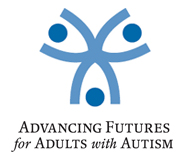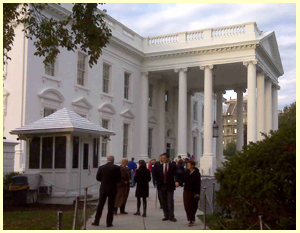by Beth Finke
It’s Disability Employment Awareness Month, and An NPR show called The Story contacted me last week to record an interview. If you’ve never heard The Story, here’s a description of the show from their Web site:
At a time when “celebrity rules” and the only “ordinary” people we see are faces in the crowd, The Story reminds listeners that their stories and their lives matter. We believe that by creating a space for first person stories we are choosing not to accept a pollster’s version of our thoughts and attitudes.
The Story originates on North Carolina Public Radio, so Dick Gordon, the show’s host, was in Chapel Hill during Friday’s interview. Me? I sat alone with my Seeing Eye dog Hanni in a recording booth in Evanston, Illinois. The sound man, seated in another room behind a plate of glass, says if you listen carefully you’ll hear Hanni’s harness jiggle as she settles in at the beginning of the taping. She slept for the rest of the hour. She’d heard this all before.
The interview questions centered on my working life. I lost my sight in 1985. The Americans with Disabilities Act wouldn’t be signed into law until five years later. When I lost my sight, I lost my job. Worse than that, I lost my self-confidence. It took a while for me to get the gumption to apply for work again, but once I did I met up with some pretty wonderful, flexible employers. A series of part-time jobs helped rebuild my confidence back. Today I’m a published author, a teacher, and … a blog moderator!
If you read my blog post about a speech Sen. Richard Durbin (D-IL), gave on hiring people with autism and other disabilities, you know he mentioned a recent DePaul University study on the costs and benefits of employing people with disabilities. Durbin used the study to remind his audience that people with autism and other disabilities make very loyal employees.
This is what the study found: on their annual performance reviews, employees with disabilities rated slightly higher than their co-workers without disabilities. Employees with disabilities took fewer scheduled and unscheduled days off work — just the opposite of what many might assume.
In addition, the average cost of accommodating the workers with disabilities — modifying the workplace to meet their needs — was $313. As investments in good, dependable workers go, that’s a bargain.
I wasn’t savvy enough to refer to research studies when they taped my interview for The Story, but I hope the spirit of that study shines through when the show airs. The Story is distributed nationally by American Public Media. It can be heard in North Carolina on WUNC-FM and WRQM-FM (90.9) in Rocky Mount. The show can also be heard on other stations across the U.S. including WBEZ in Chicago and KPCC in Los Angeles. I’m not sure yet when my particular segment will air, so stay tuned — I’ll let you know as soon as I find out.
In the meantime, take a look at a post called Disability Employment Awareness in the News on the Justice for All Activist Blog. The post has a nice round-up of articles about disability employment awareness that have already been published this month.
 You are invited! Easter Seals is proud to be part of Advancing Futures for Adults with Autism (AFAA), a national consortium seeking to create meaningful futures for adults with autism. On November 13, Americans in 15 cities will come together to create a policy agenda for addressing the needs of adults with autism. These needs include housing, jobs, recreation, friends and supportive communities.
You are invited! Easter Seals is proud to be part of Advancing Futures for Adults with Autism (AFAA), a national consortium seeking to create meaningful futures for adults with autism. On November 13, Americans in 15 cities will come together to create a policy agenda for addressing the needs of adults with autism. These needs include housing, jobs, recreation, friends and supportive communities.






 I am writing to give a huge thanks and “shout out” to our good friend Maurice Snell. Before I left for
I am writing to give a huge thanks and “shout out” to our good friend Maurice Snell. Before I left for  What a terrific Capitol Hill Day we had in Washington D.C.!
What a terrific Capitol Hill Day we had in Washington D.C.!